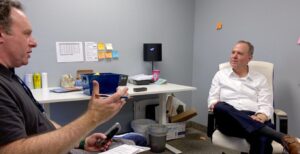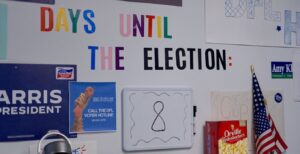While there is only a week until Election Day and early voting is taking place around the country, there is no shortage of get-out-the-vote efforts helping both major parties get voters to the polls and sell their message up and down the ticket. Sometimes that means calling in big names to help fire up a volunteer base that could grow weary down the stretch of a long campaign.
California Democratic Rep. Adam Schiff, who is running for the open Senate seat in that state, was in Minnesota Monday to speak to a group of canvassers at the DFL Party’s Bloomington office, along with Sen. Amy Klobuchar and Third District Congressional candidate Kelly Morrison, before being the keynote speaker at the state party’s Founder’s Day dinner. On his visit, he spoke exclusively with TC Jewfolk about his Jewish upbringing, party-building, and some of the pains of being a “big tent” party.
The conversation has been lightly edited for length and clarity.

Rep. Adam Schiff (left) with congressional candidate Kelly Morrison (far right), End Citizens United President Tiffany Muller, and Minnesota Sen. Amy Klobuchar. (Lonny Goldsmith/TC Jewfolk).
TC Jewfolk: It’s your first statewide election, and you’re taking a break from your own race to go around the country and do party-building. Why is that sort of activity important to you right now, especially as we get a week out from Election Day?
Rep: Schiff: I think so many of the things that Californians want me to do in the Senate will be immeasurably easier if we have a Democratic Senate and if we have a Democratic House. Californians want more housing, they want cheaper housing, they want answers to homelessness, they want more affordable childcare, and it would be very hard to get any of those things through Congress unless Democrats are controlling the agenda. I really view the work I’m doing to help these other senators and house candidates as part of work on behalf of my hope for California constituents.
TCJ: Where does the Congress come in on those issues, as opposed to this being a state or local issue?
Schiff: There’s a lot we can do at the federal level. Probably the most powerful thing would be to dramatically expand the low-income housing tax credit to help developers to build housing that’s affordable. We need to build hundreds of thousands of units in California alone, really millions around the country, so we can have a big role in making that economically feasible. We can also incentivize local governments to get to ‘yes’ quicker on building housing. And vis-a-vis homelessness, I have legislation, for example, that would have the [Government Accountability Office] analyze homeless programs – [which] are working, which are not working, so we are making better investments and things that are successful. These are all things we can do. It’s going to have to be a federal, state, and local priority and sense of urgency that makes it happen.

TC Jewfolk Editor Lonny Goldsmith with California Rep. Adam Schiff (Lev Gringauz/TC Jewfolk).
TCJ: How does your Jewish upbringing inform your politics and policy priorities?
Schiff: I was just downstairs talking with someone who brought up Tikkun Olam, [and] that is very much at the center of my public service: the idea that we all have an obligation to mend the world, and the world is badly in need of mending at this moment. But I also think about my favorite passage in Micah, “What is required of us but to do justice, to love mercy, and walk humbly with thy God.” I think those are three essential injunctions for anyone in public service. I think they’re pretty darn important for anyone in life, period. But I think the values I was raised with, the idea that we all stand on the shoulders of those who went before us, and we have an obligation to those who come after us – I think that all springs from my Jewish background.
TCJ: Obviously being Jewish, and certainly for us working in the Jewish world since Oct. 7 of last year, it has been an interesting ride these last 13 months. One thing that we’ve seen here at the University of Minnesota – I know that’s been an issue on a lot of the college campuses in California – is the climate on campus for Jewish and Zionist students. What role do you think the Senate or the government at large should be playing in terms of protecting students but also not infringing on the freedom of speech of those students who want to protest?
Schiff: I think we have an important oversight role to play, particularly given that federal funding goes to our universities, to make sure that universities that are receiving federal funding are creating a safe learning environment for all their students. Over the past year, all too many universities have become unsafe for Jewish students and other students.
At UCLA, where there was some of the worst campus violence, I was shocked to see, even after all of that drama, that when a federal judge ruled that UCLA had an obligation to make sure that all sections of the campus were open to all students, regardless of faith, and if they weren’t accessible to everyone, they shouldn’t be accessible to anyone. And the University took issue with that. How do you take issue with that? I think we have an obligation to hold universities accountable, to ask the tough questions, to ensure that universities are establishing time, place and manner restrictions, content-neutral restrictions, and then living by them and making all their students live by them. There’s a pretty bright line between speech and violence and I have no inhibition about condemning protests when [they turn] violent.
TCJ: Israel is looking at a multi-front war: Iran, on its southwest border and its northern border [with Iran’s proxies Hezbollah and Hamas]. What’s your stance on this in general, and specifically, what responsibilities does Israel have in terms of how it comports itself with these efforts?
Schiff: I always begin with where this began, which was Hamas, the massacre of 1,200 people, the murder and rape and torture of innocent civilians, and the fact that Israel has a right to defend itself. Has a duty to defend itself. That no nation that suffered what Israel suffered could accept continued governance by the terrorist organization that attacked them on Oct. 7. So Hamas cannot continue to govern Gaza. Hamas cannot pose a military threat to Israel and we should be working towards a two-state solution where Palestinians have a safe and secure state, not controlled by a terrorist group, and Israelis can live in peace and security.
Ideally, it’s a regional agreement in which Saudi Arabia recognizes Israel, and Israel recognizes a Palestinian state. One of the terrible tragedies of the war has been Hamas’ success in killing the idea of a two-state solution, even in Israel. But it’s hard for me to see a long-term, durable peace that doesn’t include two states, one for Palestinians, one that is a safe and secure Israel.
TCJ: Both you and Sen. Klobuchar in your remarks to the canvassers talked about the Democratic Party as a big-tent party. But locally, Minneapolis City Council had a fairly divisive ceasefire resolution that they pushed back in January, and the “uncommitted” movement here and in Michigan during the primary process were vocal. How does a big tent party continue to thrive when you have issues like that that are so divisive?

The election countdown board at the DFL’s Bloomington office. (Lev Gringauz/TC Jewfolk)
Schiff: Well, I think by adhering to a set of core values that recognizes that the relationship between United States and Israel is a deeply important relationship, that it is a relationship that needs to transcend whoever the Prime Minister is at a given moment, just as it has to transcend whoever the President is at a given moment. As I would not have had people abandon the United States because Trump was president, I would not have people abandon Israel because Netanyahu is prime minister. There are always going to be tensions within a party as big and broad as the Democratic Party, and those tensions will flare, but I would rather have a big-tent party than a small cult that worships at the altar of a deeply flawed human being.
TCJ: How have those kinds of tensions and the debates within the party helped sharpen your arguments or perspectives on different areas?
Schiff: Well, I keep coming back to a few different things. The first is that at this moment, Haitians are the target of the former president’s animosity and his bigotry and hate. How can we, with our history, consider supporting someone that would so dehumanize a group of people and what should give us confidence that we won’t be next? Second, this is a person who is a transactional human being, who only cares about himself above all else. And the day that Donald Trump decides the family’s financial interest is with Gulf nations hostile to Israel, he’d abandon Israel in a heartbeat.
TCJ: How are you feeling about the overall arc of the Trump saga, because you featured very prominently in both [of his] impeachment trials. Now here you are campaigning again against Trump as a presidential candidate. It feels very much like the Pirkei Avot quote, “It is not your responsibility to finish the work, but neither are you free to desist from it.” So how are you feeling right now? Because it’s kind of remarkable that the impeachment has not featured much at all, it seems, in a lot of the conversations around this election. And yet here you are kind of connecting both of those points.
Schiff: I think the through line that runs through the impeachments and through Jan. 6[, 2021 insurrection] and the committee work and the present is the escalating threat to our democracy, and that very much is a feature of this endpoint of the campaign. [Republicans] have chosen to make their closing argument about the necessity, in their view, of calling out the military against their domestic enemies, and I think, the warnings that we made during the impeachment were all too on point, and it didn’t require any kind of clairvoyance to see who this man is or what he would do if he were given the opportunity to do so.
He has told us who he is. He has demonstrated who he is. And I think that he’s more dangerous than ever. He has more at stake in this election than ever. He may feel, and perhaps not without reason, that if he doesn’t win, he may go to jail. And so he is already laying the foundation for another big lie about the upcoming election. And so we are tragically back where we were with the threat of another Jan., 6, and this time, we go in with our eyes wide open, and we need to make the right choice next week.
TCJ: Coming back to some of the core Jewish issues and concerns, there’s been a really interesting conversation about the rhetoric used. There’s been a long-running conversation in the Jewish community, especially when it comes to Holocaust memory, over what is right and wrong with the lines that we’re crossing with this rhetoric and the depictions that we’re making, and it seems kind of like we’ve set all that aside over the past maybe month or so, and the messaging was very much about Trump as an enemy of democracy, very much in the same vein as Hitler. Where are you at with: Is this appropriate kind of messaging? Are you worried about this opening the door to more of this, everything gets compared to Hitler and the Nazis at a certain point – which has been a concern for many years. Where are you at with that and those kinds of Jewish concerns about that rhetoric?
TCJ: [Democrats are campaigning on] a very clear tie-in that we’re in a 1920s/30s situation when it comes to the threat against democracy. There’s been a long-running conversation in the Jewish community, especially when it comes to Holocaust memory, over what is right and wrong with the lines that we’re crossing with the depictions that [are being made], and it seems like [those concerns have been set aside] over the past month or so. The messaging is very much about Trump as an enemy of democracy – very much in the same vein as Hitler. Where are you at with: Is this appropriate kind of messaging? Are you worried about this opening the door to more? Everything [in the political sphere] gets compared to Hitler and the Nazis at a certain point, which has been a concern for many years.
Schiff: You know, for a long time, I resisted the comparison to the 1930s – but then the comparisons became too on-point to ignore. In the 1930s the [German] Conservatives thought they could make use of this not-so-bright Corporal [Adolf Hitler]. They could make use of his popularity and his populism, and he completely remade that party overnight. Trump has done the same thing.
Republicans – establishment Republicans – thought they could make use of him in 2016 and he destroyed that party and rebuilt it in his flawed image. And the things he’s saying he wants to do, the language that he’s using, the way he’s dehumanizing people – who could tell where it all leads? This is uncharted territory in the United States of America, but we’ve seen enough from what he tried to do in his first four years to know that we shouldn’t give him another try and find out. I think we see history littered with examples of people who ignored the risk and didn’t want to believe what a wannabe despot was saying to their peril, and we shouldn’t make that mistake here.
TCJ: What’s your plan or message to the Jewish community, but also to all the other minority communities that will be at risk if Trump wins again? What’s the outlook for the next four years if Trump wins, and what happens to us then?
Schiff: I think it means that we enter a period of great uncertainty and instability where a lot of the time and effort in Congress will be to provide the guardrails that have been taken down by the Supreme Court with its immunity decision, that will be taken down by the former president, who began the first four years with at least some people of independence and stature would stand up to him, but who will start any subsequent term with utter sycophants.
We will have to use whatever tool and instrumentality we can to defend our democracy and defend the American people whom Trump considers enemies, and that may be a shifting group of people, depending on his whim. We’re also going to need to try to continue to get things done for the country and compartmentalize wherever we can.

